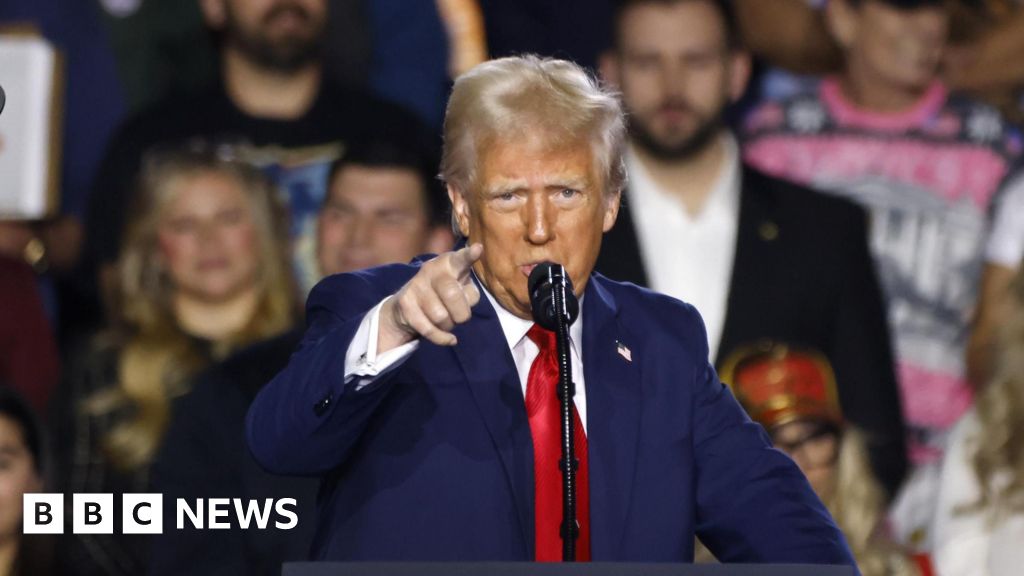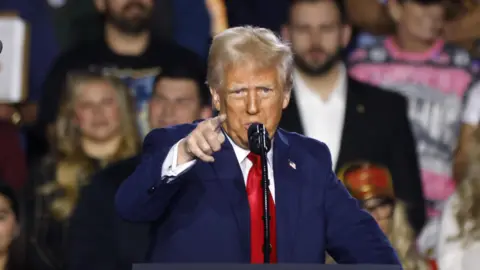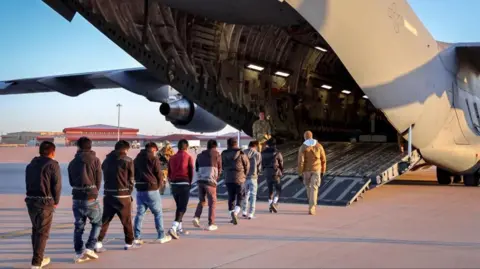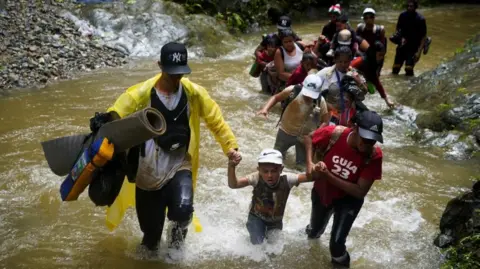Co-operate or else: Trump’s Colombia face-off is warning for all leaders

South America correspondent
 EPA
EPALess than a week into his presidency, Donald Trump has instigated his first international tariff dispute. And the target isn’t China, Mexico or Canada – frequent subjects of his ire – it’s Colombia, one of America’s closest allies in South America.
Colombia’s offence was refusing to allow two US flights carrying deported migrants to land because they were military, not civilian, transport planes. That appears to have been enough to prompt Trump to drop the hammer.
“We will not allow the Colombian government to violate its legal obligations with regard to the acceptance and return of the criminals they forced into the United States,” Trump posted on his social media site.
On top of the 25% tariffs he said he would impose, Trump said the US would introduce a travel ban and “immediate visa revocations” on Colombian government officials, as well as its allies and supporters.
For his first week in office, the US president had seemed to be prioritising executive action on immigration over trade measures – even if the latter were a key campaign promise. As if to drive that point home, his first major announced tariffs are being enacted to punish a nation that he views as not sufficiently supporting America’s new hard-line immigration polices.
On a day when Trump had no public appearances – he’s at his Miami resort, having reportedly played a morning round of golf – the president has chosen to make an example of Colombia.
He is serving a warning to US allies and adversaries alike: If you don’t co-operate with the US, the consequences will be severe.
 US Government
US GovernmentThis is a formidable challenge for Colombia, but it is also a test for the new Trump administration.
If his sanctions lead to higher prices for US consumers will the American public object? Will they be willing to tolerate some financial pain incurred to advance Trump’s immigration priorities?
The US imports about 27% of its coffee from Colombia, according to the US Department of Agriculture, as well as other goods like bananas, crude oil, avocados and flowers. The coffee imports alone are worth nearly $2bn (£1.6bn).
Importers could shift to other sources to avoid this, which would hit Colombian producers by reducing a key market.
Colombia’s President Gustavo was quick to respond on Sunday afternoon, launching his own retaliatory strike in the war of words.
It’s no secret that Petro doesn’t like Donald Trump – he’s heavily criticised his policies on migration and the environment in the past. That just ratcheted up.
In a lengthy response on X, he said Trump would “wipe out the human species because of greed” and accused the US president of considering Colombians an “inferior race.”
Petro went on to describe himself as “stubborn” and said that while Trump could try to “carry out a coup” with “economic strength and arrogance” he would, in short, fight back.
Not only did Petro appear to threaten his own retaliatory tariffs, but most significantly he said: “From today on, Colombia is open to the entire world, with open arms.”
While Trump is unlikely to take threats from Colombia, this is something that should worry a US president who wants to tackle migration. His incoming administration officials have made clear that mission will require looking beyond the Mexico border.
Trump’s pick for deputy Secretary of State Christopher Landau has long argued that “working with other countries to stop such migratory flows” must be a “global imperative of US foreign policy”. Sunday’s spat might make working together a lot less likely.
Tens of thousands of migrants every year from around the world, from India to China, head north towards the US after landing in South America and travelling up through Colombia across the Darien Gap – a key choke point just north of the Panama-Colombia border. It’s a dangerous journey usually facilitated by criminal gangs.
 Reuters
ReutersThe US’s retaliatory measures will no doubt make it harder for Trump’s administration to work with Colombia to stop this pattern.
President Petro alluded to this in his response to Trump’s actions, noting that if talks over managing migration through Darien were suspended, “illegal activities will increase”. Those comments could be viewed as a veiled threat of more undocumented migrants on the way.
Petro was quick to say that his country would not refuse Colombian nationals deported from the US – only that they must receive “dignified treatment”. He even offered use of his presidential aircraft as an alternative means of transport.
According to senior US officials, however, talking on background to CBS, the BBC’s US partner, that’s not enough to avoid the sanctions.
Still, despite a Sunday of high drama, there does seem to be a path to de-escalate this sudden diplomatic standoff – if egos and national pride don’t get in the way.
But these kind of tariffs are a test of will. And, from the looks of it, this is just Trump’s opening move.
Related
Canada says too little, too late as Trump flip-flops on…
Nadine Yousif and Ali Abbas AhmadiBBC News, TorontoWatch: Canadian liquor store clears out US alcohol in response to tariffsNot long after the US imposed their
Vietnam, Thailand, and Philippines Among Top Asian Destinations Most-Searched by…
Home » Philippines Travel News » Vietnam, Thailand, and Philippines Among Top Asian Destinations Most-Searched by American Travelers, Driven by Surge in Viet
Trump tariffs tarnish ties: Americans anxious about travel to Canada…
Will Trump's tariffs on Canadian goods entering the U.S. affect tourism at home, tarnishing ties Canadians and Americans have shared for decades? It's a fair qu
Looming Trump travel ban strikes fear in Afghans who worked…
Expectations that President Donald Trump will soon bar Afghans and Pakistanis from entering the United States has set off panic among Afghans who were promised












